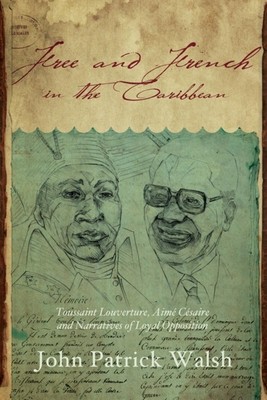
- We will send in 10–14 business days.
- Author: John Patrick Walsh
- Publisher: Indiana University Press
- ISBN-10: 0253006309
- ISBN-13: 9780253006301
- Format: 15.2 x 22.6 x 1.5 cm, softcover
- Language: English
- SAVE -10% with code: EXTRA
Reviews
Description
In Free and French in the Caribbean, John Walsh studies the writings of Toussaint Louverture and Aimé Césaire to examine how they conceived of and narrated two defining events in the decolonializing of the French Caribbean: the revolution that freed the French colony of Saint-Domingue in 1803 and the departmentalization of Martinique and other French colonies in 1946. Walsh emphasizes the connections between these events and the distinct legacies of emancipation that emerged through the narratives of revolution and nationhood passed on to successive generations. Part one concerns Toussaint's grasp of the limits of French Republicanism and his repositioning of the doctrine of the rights of man over against national sovereignty. Part two focuses on Césaire's reading of Toussaint as he confronted the issue of assimilation into the French Republic. By re-examining these figures in light of their multi-layered narratives, the book offers a deeper understanding of the historical and contemporary problem of "free and French" in the Caribbean.
EXTRA 10 % discount with code: EXTRA
The promotion ends in 17d.04:14:19
The discount code is valid when purchasing from 10 €. Discounts do not stack.
- Author: John Patrick Walsh
- Publisher: Indiana University Press
- ISBN-10: 0253006309
- ISBN-13: 9780253006301
- Format: 15.2 x 22.6 x 1.5 cm, softcover
- Language: English English
In Free and French in the Caribbean, John Walsh studies the writings of Toussaint Louverture and Aimé Césaire to examine how they conceived of and narrated two defining events in the decolonializing of the French Caribbean: the revolution that freed the French colony of Saint-Domingue in 1803 and the departmentalization of Martinique and other French colonies in 1946. Walsh emphasizes the connections between these events and the distinct legacies of emancipation that emerged through the narratives of revolution and nationhood passed on to successive generations. Part one concerns Toussaint's grasp of the limits of French Republicanism and his repositioning of the doctrine of the rights of man over against national sovereignty. Part two focuses on Césaire's reading of Toussaint as he confronted the issue of assimilation into the French Republic. By re-examining these figures in light of their multi-layered narratives, the book offers a deeper understanding of the historical and contemporary problem of "free and French" in the Caribbean.


Reviews